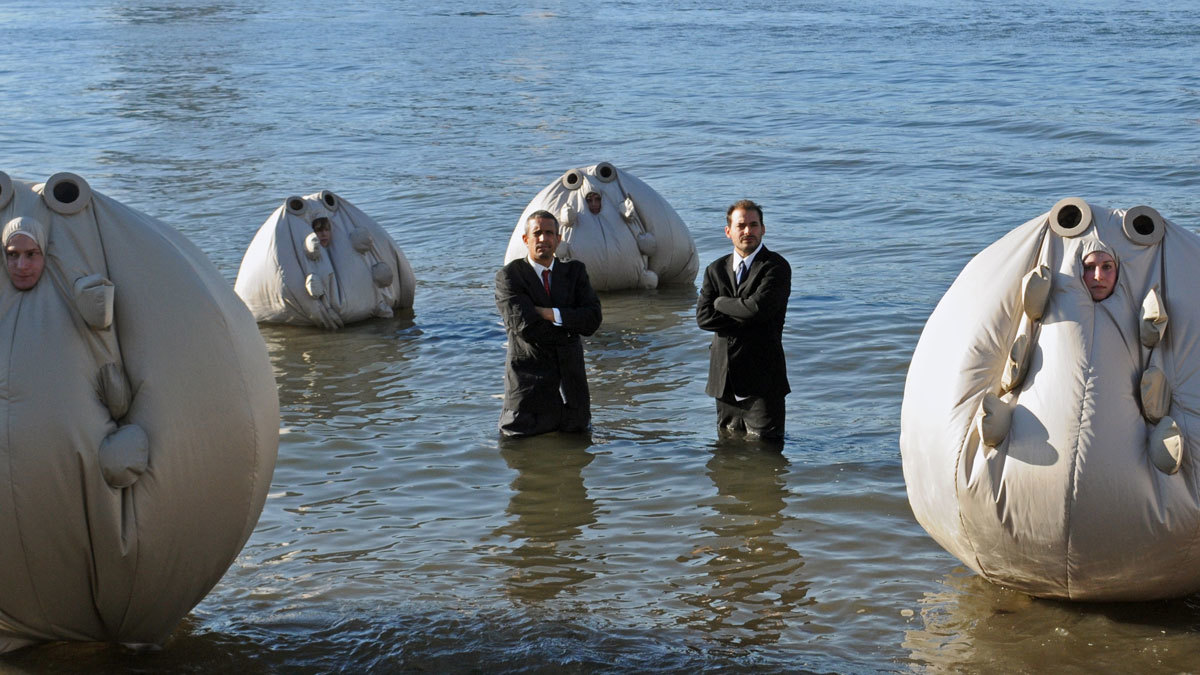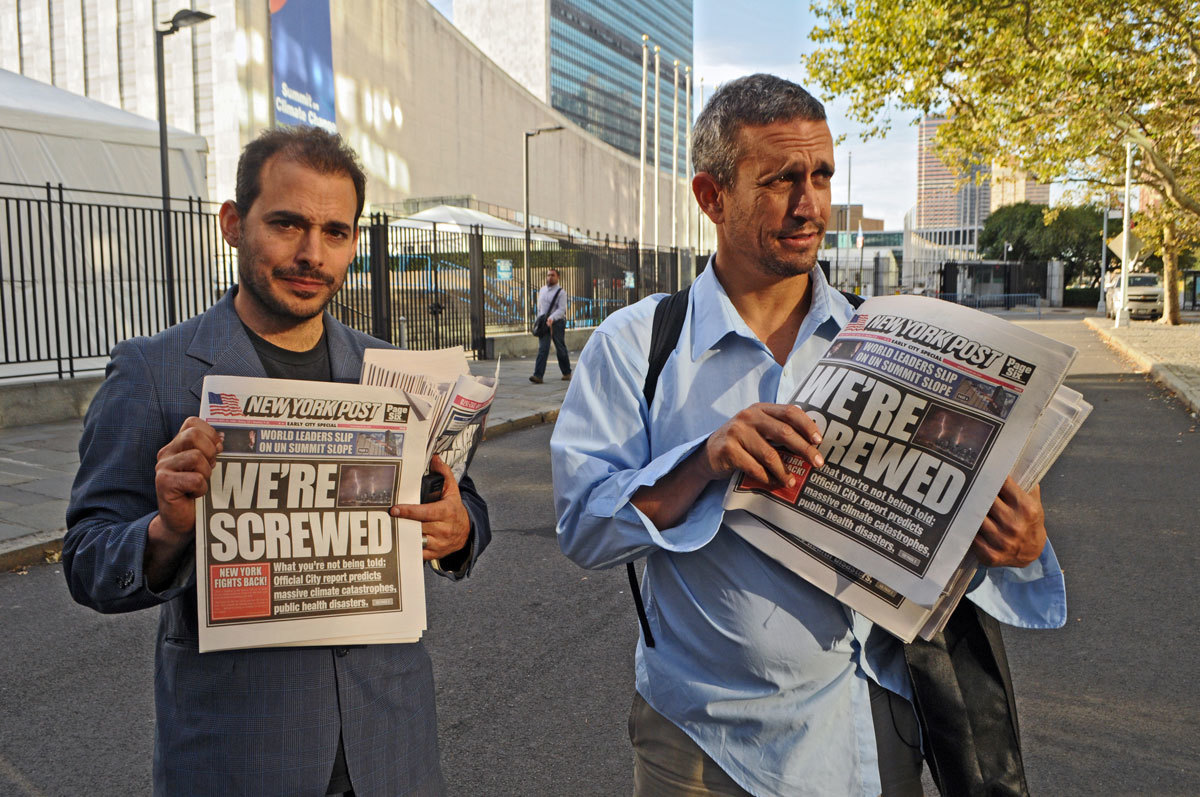For the last 20 years comic activists the Yes Men have been pulling elaborate pranks and media hoaxes to discuss the relationship between corporations and governments, and its effect on the socio-political landscape. Their latest hilarious film, The Yes Men Are Revolting, tackles climate change, specifically the behaviour of oil companies and follows Mike Bonanno and Andy Bichlbaum as they pull a series of comical interventions around the world. Arctic drilling, climate disruption in Uganda and controversy at US Chamber of Commerce are just three of the subjects the fearless duo take on, with every adventure captured by the cameras of co-director Laura Nix.
As the film opens in cinemas across North America (it will soon be available on-demand in Europe) the trio have been suitably elusive with the Yes Men stopping in New York to pull a street stunt in NYC. There, the pair impersonated Shell workers and handed out snow-cones made of “the last ice-berg in existence” to raise the alarm on the Anglo-Dutch company sailing its oil-rig, the Polar Pioneer, into the Arctic. While the pace and clever hi-jinks roll out, embedded into this new film is also a close-up on these pranksters personal journeys as they face not only a race against time for the climate but also in their own lives. What happens when activists grow up, and grapple with the knowledge that it’s their generation who had the biggest window of opportunity to save the day? We caught up with Laura and Mike to find out.
The movie begins back in 2009, why?
Laura: It begins with the world preparing for the UN climate conference in Copenhagen, COP15. We begin there because many activists felt full of hope, especially since Obama had entered office. What happens afterwards explains why we can’t count on government leaders to bring about the change we know we need.

It’s been flagged by NGOs that increased government anti-privacy laws are being used to surveil environmentalists, do you have any thoughts or experiences you can share on this?
Laura: In fact, during the making of this film, the Yes Men were spied on by a corporate intelligence agency that had been hired by Dow Chemical, in response to an action that appeared in the second film. They had pretended to be Dow and agreed to pay full reparations for the Bhopal disaster. The announcement ended up wiping $4 billion off of Dow’s share price. Dow wasn’t too happy about that, so they hired corporate spooks to figure out what The Yes Men were up to next. The best part is that the Yes Men found out about this through Julian Assange. He asked them to go meet him at a country estate where he was under house arrest, to let them know they were being spied on, and the scene shows a side of Assange most people haven’t seen. Unfortunately, we didn’t get to include it in the film, but we are going to release that scene separately soon.
People who have acted for the climate can often recount an event or a specific moment that was a tipping point in them taking action, could you share yours?
Laura: I was part of ACT UP and Queer Nation in the late 80s and early 90s, and that experience was transformative for me. I did actions like dress up as a conservative young Christian and attend lectures by the Archbishop… we would wait until he started speaking and then pull out posters that had been hidden in our sleeves that read “JESUS LOVES LATEX,” and get dragged out by our hair. It feels euphoric to do those kinds of actions with other people, it’s incredibly energising.
Mike: The moments just keep happening! But one does stand out. I had the unfortunate experience of having the TV on during the Superbowl half-time show in 1991. It was a mashup of New Kids on the Block, young children dancing in star-spangled western-wear, Iraq war invasion footage, a presidential address from Bush the First. It was so sick that I went out and bought a paintball gun the next day… so that I could graffiti the “Aim High” recruitment billboards from afar.

The Yes Men clearly have a lot of fun and get into a lot of scrapes, were any fancy dress costumes injured in the making of this movie?!
Laura: Well, I think you’ll notice the incredible marching band outfits the guys wear in the Gazprom action in Amsterdam. I think those are the best outfits in this movie. The Survivaball doesn’t really count as a costume since it’s a one-size-fits-all solution to global warming.
Mike: There is a scene in this film where I get grabbed by police and tumble down the steps of the US Capitol. I’m wearing a Survivaball costume. It was heavily damaged in the fall, as was my megaphone, which laid on the ground in parts afterwards. But I got away with only a few bruises, (and did not get arrested!) proving that the Survivaballs do indeed work.
In a clip from the movie, where the Yes Men, Rainforest Action Network and Amazon Watch nix an $80 million Chevron faux street campaign, the street artist that Chevron originally contacted to help roll out the campaign says, “I just wanted to show Chevron that I can do the work, I just don’t want to.” All of you are smart and talented enough to have made tons of money working in advertising companies, why didn’t you?
Laura: Don’t get me wrong, the money would be nice. Very nice. Once upon a time, I spent a couple years working in marketing for the studios in LA. I needed to pay off the debt from my first feature film, and I did EPKs and behind-the-scenes branded content for Hollywood films. I learned a lot from those experiences, but I feel more connected doing work about issues I deeply care about. Long-term, I have to feel engaged and committed to be able to work this hard.
Mike: I think it just did not occur to us because it just does not seem fun at all. It’s kind of like thinking up practical jokes that victimise the powerless: why would anyone want to? Not fun at all. Targeting those in power makes it fun. So, until an anti-advertising agency has the money to hire us… oh wait, we kind of work for one already. Heh.
Credits
Text Sarah Hay
